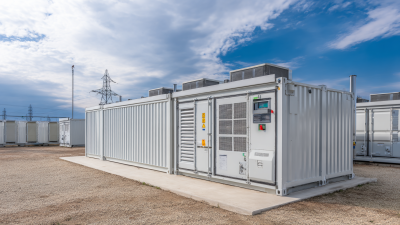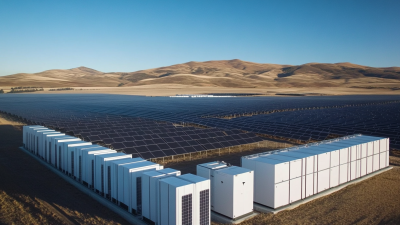As the world increasingly turns to sustainable energy solutions, the significance of efficient energy storage systems has never been more pronounced. The global energy storage market is projected to grow from approximately $9.7 billion in 2021 to $22.3 billion by 2026, reflecting a compound annual growth rate (CAGR) of around 18%. Among various energy storage options, 10kW Battery Storage stands out as a versatile solution for both residential and commercial applications. This capacity not only enables users to store excess energy generated from renewable sources, like solar panels, but also provides backup power during grid outages. According to a recent report by Wood Mackenzie, the deployment of residential battery storage systems is expected to exceed 1.2 million units annually by 2025. With such promising growth and adoption rates, exploring the advantages of 10kW Battery Storage is essential for stakeholders aiming to enhance energy resilience and support a sustainable future.

The increasing emphasis on renewable energy sources necessitates the development of efficient energy storage solutions. A 10kW battery storage system plays a crucial role in maximizing the utilization of renewables such as solar and wind energy. By storing excess energy generated during peak production times, these systems can release power during periods of high demand or low generation, effectively smoothing out the intermittent nature of renewable energy sources.
As European countries confront energy crises fueled by geopolitical tensions and climate change, innovative storage solutions, including virtual power plants, have emerged as potential saviors. These technologies can help integrate decentralized energy resources and enhance grid stability. A 10kW battery, with its ability to store significant amounts of energy, can provide households and businesses with greater energy independence and resilience, allowing them to capitalize on fluctuating energy prices and reduce reliance on conventional power sources. In this context, the role of battery storage is not just to provide backup power but to optimize the entire energy ecosystem, paving the way for a more sustainable and efficient energy future.
The integration of 10kW battery storage systems is rapidly gaining traction among homeowners and businesses, providing a robust solution for energy efficiency and sustainability. According to a report by the International Energy Agency (IEA), residential energy storage systems can help households reduce their electricity bills by up to 30% by effectively shifting energy usage from peak to off-peak hours. This not only lowers costs but also enhances energy reliability, allowing users to harness renewable energy sources such as solar power more effectively.
Furthermore, businesses implementing 10kW battery systems can experience significant operational advantages. A study by BloombergNEF indicates that commercial users can achieve an average return on investment (ROI) of 15-20% within the first five years of installation. The scalability of 10kW systems allows businesses to tailor energy strategies that mitigate risks associated with fluctuating energy prices and potential outages. This adaptability, combined with the decrease in battery costs—projected to fall by 58% by 2030—positions 10kW battery storage as a key component in the transition toward a more sustainable energy future.
| Benefit | Description | Impact on Homeowners | Impact on Businesses |
|---|---|---|---|
| Energy Independence | Reduces reliance on the grid by storing renewable energy. | Provides power during outages, increasing reliability. | Ensures continuous operations during grid failures. |
| Cost Savings | Reduces electricity bills by utilizing stored energy during peak rates. | Lower monthly utility expenses and potential rebates. | Decreases operational costs by managing energy consumption. |
| Environmental Impact | Supports cleaner energy sources and reduces carbon footprint. | Promotes a sustainable lifestyle and home efficiency. | Helps businesses meet sustainability goals and improves public image. |
| Increased Property Value | Battery storage systems can enhance the attractiveness of a property. | May lead to higher selling prices and faster sales. | Attractive to tenants and investors looking for energy efficiency. |
| Grid Support | Offers support to the local grid during high demand periods. | Contributes to community energy resilience. | Can provide ancillary services for grid stability. |
The transition to sustainable energy solutions is gaining momentum, and
10kW battery storage systems are a critical component in realizing cost savings for homeowners. With
solar panel installation costs averaging around
$28,000 in 2025, the financial burden can be significantly alleviated through the
integration of efficient battery systems. For instance, homeowners can benefit from
federal rebates that provide savings of roughly
$330 per kWh for battery installations, further enhancing the economic
feasibility of adopting solar energy coupled with battery storage.
Moreover, the payback time for home battery systems has dramatically improved due to these upcoming
government incentives. Research indicates that with the right configurations,
users can achieve a simple payback period that positions 10kW battery systems as an attractive investment
for many households. Enhancements in battery technologies, such as
vanadium redox flow batteries, are influencing overall system costs and
providing options for diverse energy needs. By strategically implementing a
10kW battery system alongside solar panels, homeowners not only reduce their immediate energy expenses but
also contribute towards a sustainable energy future, maximizing their long-term
financial and environmental benefits.

The transition towards sustainable energy solutions has sparked a crucial comparison between 10kW battery storage systems and traditional energy sources. According to a recent report by the International Energy Agency (IEA), energy storage technologies, including batteries, are projected to play a significant role in the global energy landscape, with installations expected to exceed 800 GWh by 2040. This shift not only enhances grid reliability but also supports the increased integration of renewable energy sources.
When evaluating 10kW battery storage, its advantages over conventional systems become apparent. For instance, the U.S. Department of Energy highlights that energy storage can strategize demand response and reduce peak energy costs. Traditional energy solutions often rely on coal and natural gas, with the Energy Information Administration (EIA) noting that these sources can generate up to 50% more carbon emissions than battery storage solutions. Thus, the adoption of 10kW battery systems can lead to significant reductions in greenhouse gas emissions while providing a more resilient and flexible energy supply critical for sustainable development.
As the world shifts towards more sustainable energy solutions, the integration of
10kW battery storage systems is becoming increasingly pivotal in shaping energy policies.
According to the International Energy Agency (IEA), battery storage capacity is projected to increase by more than
25 times by 2040, influencing renewable energy adoption and grid stability.
This significant boost emphasizes the necessity for intelligent energy management systems that support the seamless
incorporation of intermittent renewable sources like solar and wind.
Implementing 10kW battery systems can alleviate pressure on traditional energy grids,
particularly during peak demand periods. A 2021 report from BloombergNEF indicates that a well-established battery
storage infrastructure can reduce energy costs by up to 30% for both consumers and producers.
Moreover, these systems provide resilience against power outages and price volatility, establishing a
more reliable energy landscape.
Tips: When considering the installation of a 10kW battery, evaluate your energy consumption patterns to determine
the best usage times for stored energy. Additionally, look for models with smart technology capabilities that can optimize
charging and discharging based on real-time data, maximizing your savings and sustainability efforts.





